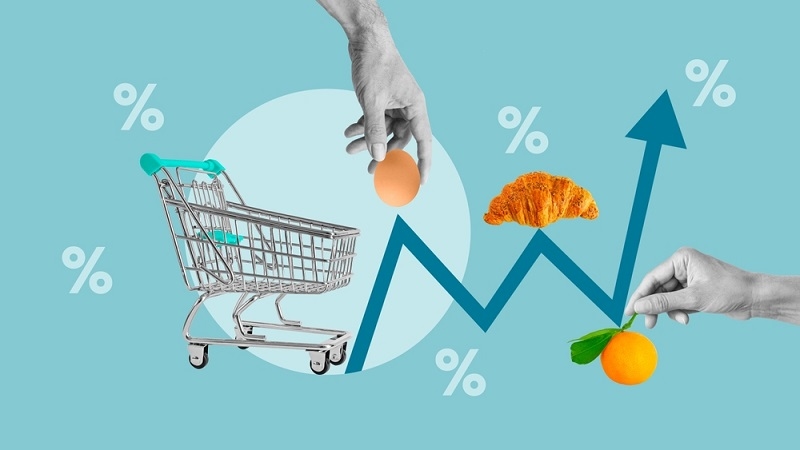
Inflation is one of those financial terms people always hear but don't always take the time to understand. It may sound technical and like a concept reserved for only economists, but it affects your life every day! Whether it's the cost of groceries, rent, savings accounts, or budgets, inflation is an essential factor determining your financial health.
In 2025, many individuals and families still wonder the same fundamental question: What is inflation, and how does it relate to my money? This guide will help you answer "inflation explained simply" and understand how it relates to your money, spending, and savings.
In its simplest terms, inflation is the steady increase in the price of goods and services over time. Inflation occurs when the purchasing power of money decreases. Simply put, the dollar you have today will buy you fewer dollars' worth of items tomorrow.
For example, if a cup of coffee was $2 last year but $2.20 this year, then that 20-cent difference is inflation. While that doesn't seem alarming and can be considered a nominal increase, rising prices accumulate in every part of life and add to overall expenditures.
To envision inflation without financial terminology, consider this:
You save $100 in a jar. After a year, you go to spend it at the grocery store. Prices have gone up, so the price for items that were $100 is now $110. Your money is still worth $100; it has just lost some of its purchasing power in the real world.
That is inflation explained—your money doesn't go as far as it used to.
There are many reasons behind rising prices, and often they affect each other:
When demand exceeds supply, prices go up. For example, if everyone wants the newest smartphone, and there are not enough, the price will rise.
When the cost of producing a good increases (for example, wages, raw materials, or energy prices), businesses will raise prices to cover these expenses.
Workers demand a pay raise to keep up with the increase in living expenses, which causes employers to raise prices.
Knowing the drivers of inflation can help you better understand why the prices of many everyday items may increase, even if your pay stays the same.

Inflation impacts almost every cost in your daily life. Let me show you some examples of how inflation impacts everyday prices:
This widespread impact on expenditures is one reason many will feel financial pressure even though their wages may not have changed much.
When we think about inflation in 2025, we’re also thinking about its influence on three primary areas of personal finance:
You may feel your paycheck does not buy as much as it used to. That is inflation slowly destroying your purchasing ability.
Your money sitting idle is losing value to inflation. If your savings are not growing at or higher than inflation, then you are certainly losing value to your savings.
Interestingly, inflation can be beneficial for debtors. If you owe money, the fixed amount you will pay back seems less painful as prices (and wages) increase.
Learning and knowing how inflation affects you will help you determine and adjust your financial plans.
One of the most noticeable effects of inflation is the increase in the cost of living. This refers to how much it costs to maintain a standard of living over time.
When the cost of living rises faster than wages, households feel squeezed, leading many to reassess budgets and spending priorities.
Savings are central to your financial health, but inflation directly influences how much those savings are worth. Let’s break it down:
Recognizing inflation's and savings' impact can encourage you to explore better investment opportunities that protect your money’s future value.
In times of rising prices, managing your money means planning. Here are some helpful inflation tips for consumers to help avoid becoming financially ruined:
Pay attention to every dollar you spend and follow up on how much you spend in which categories and whether the prices of those categories have increased significantly.
Take care of needs such as housing, groceries, and healthcare before you spend money on luxury items.
Use coupons, buy on sale, and buy in bulk for groceries you use a lot.
You can cancel subscriptions you don't use, eat out less, or trade a high expense for a lower-cost alternative.
Find accounts that protect your savings from inflation or invest in markets that persistently earn higher than inflation rates.
You can maintain an emergency fund, but don't let all your money sit in low-interest accounts.
Becoming familiar with budgeting during inflation can make all the difference when comparing rising prices that can ruin you, or rising prices that are inconvenient.
Inflation not only affects savings but also shapes investment decisions. Here’s how:
Choosing investments that outpace inflation can help preserve and grow wealth.
Here are some additional inflation tips for consumers looking to safeguard their wallets:
These small shifts in habits can collectively shield you from the harshest effects of inflation.
Inflation doesn’t just affect today’s prices; it shapes your long-term financial trajectory.
By factoring inflation into long-term planning, you can avoid unpleasant surprises.
Beyond the numbers, inflation also affects how people feel about money. Rising costs can create anxiety, stress, and even lifestyle changes. Families may postpone vacations, delay major purchases, or downsize living arrangements. Understanding inflation’s psychological side helps you stay calm and focus on proactive solutions.
Inflation is more than a term you hear in the news—it’s a daily reality shaping your spending, saving, and planning. Having inflation explained gives you the tools to recognize its impact and adapt wisely.
In 2025, staying informed, flexible, and proactive is the best way to protect your wallet. Whether you adjust your budget, rethink your savings strategy, or make wise investment choices, you have the power to navigate the challenges of rising prices.
Remember, while you cannot control inflation, you can control how you respond. You’ll be better equipped to protect your financial future with thoughtful planning and practical action.
This content was created by AI